Birthday: October 01, 1922
Birthplace: Wisconsin Rapids, Wisconsin
Family: Clarence and Esther Knuth
Occupation: City Police (Sergeant, Detective, Inspector)
Branch: Army
Unit: Headquarters Company, 56th Signal Battalion
Post: V Corps, European Theater of Operations
Rank: Tech 5
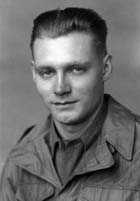
Donald Knuth
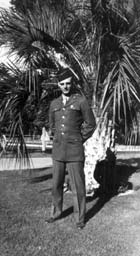
Donald Knuth
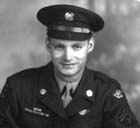
Donald Knuth
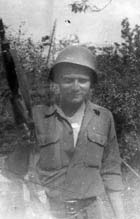
Donald Knuth
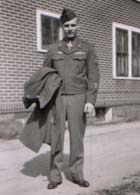
Donald Knuth

Donald Knuth
The 56th Signal Battalion was in the invasion of Normandy, France on D-Day, June 6, 1944, and also the Northern France, Rhineland, Ardennes, and Central Germany campaigns. The battalion was awarded battle streamers for each of the campaigns. The battalion arrived in England in 1942.
"I was assigned to the Battalion in April 1944, with the background in radio repair and radio code work. There were no openings in the Battalion for that specialty, so I was assigned as a messenger. There were about twenty of us in messenger duty in the Headquarters Company Message Center Section. The primary function was to deliver and receive messages from the various military units that were assigned to the V Corps, U.S. First Army. We served in England until we were placed aboard troop transport ships. The unit was broken up into various details for the invasion of Normandy, France, scheduled for the 5th of June 1944. This was not public knowledge. We knew why we were over there, but we didn't know when and where the invasion would take place.
At times we would have practice invasions on the south end of England known as Lands End, but this particular time when they put us aboard the transport on May 29, we had the feeling that this time was different. I was on the U.S.S. Charles Carrol, we joined up with other ships. Our message center unit was broken down into three separate units. One was known as the Advanced Party, Regular Party, and the Rear Party, with the thought if one is wiped out the following one could take over its functions. I was assigned to the Advanced Party with a Staff Sergeant and four others with the responsibility not only to deliver and receive messages, but also to encode and decode them. V Corps was assigned one of =the beach areas and the VII Corps was assigned another. There were five beachheads in all, covering 50 miles in width. If you approach from the sea, the far right is Utah (VII Corps), followed by Omaha (V Corps) and then three beaches; Gold, Juno, and Sword under responsibility of the British, Canadians, and then the British again, with the plan of the assaulting troops taking the beach and work inward to finally merge into one large group. The beachheads themselves were supposed to be bombarded by the Air Corps before H hour, which for Omaha Beach was scheduled for 0630, the bombing was supposed to create shell holes for protection for assaulting troops, but they fired over target and it was ineffective. Before 0630, the paratroopers went in to capture bridgeheads and such, but that didn't go according to plan. Many of them were dropped and drowned in the swampy areas under full field pack. Battleships and other naval craft also fired their heavy guns in support of invasion forces. Between V Corps beach, and VII Corps Utah beach, there was a cliff, known as Point Du Ho, which was assigned to the Rangers (specialized troops). They were to scale the 100 ft cliff and destroy the big guns on the top. The Rangers had great difficulty climbing the cliff. They used ropes that they shot up with grappling hooks to attach to the soil, but the Germans were waiting for them and knocking them off as they came. They tried ladders borrowed from the London Fire Department that they had mounted on the landing craft, but the sea was too rough to get them onto the cliff.
General Eisenhower, Allied Supreme Commander, delayed the invasions by 24 hours. Originally scheduled for the 5th, now the 6th, he gave the order to go because everything was set for the right tides and that wouldn't happen for another three weeks if they delayed. The weather wasn't much better on the 6th. On Omaha Beach, the V Corp., and the 1st and 29th Infantry Divisions along with combat engineers, etc., were the assaulting troops. Our responsibility was for all the communications of the V Corp. Our group was transferred from the U.S.S. Charles Carrol onto a Landing Craft, Infantry (L.C.I.), which was manned by the Coast Guard. We started heading towards the beach, which was littered with damaged equipment. As we approached the beach, we were about 100 yards out when they fired on us. The first shot landed on our port side, the next on the starboard side, and we knew the next would be on target. At the time, I don't know who gave the command; we were told to jump overboard, I fortunately was near the front and had the excellent opportunity to jump. As I jumped in with full field pack and rifle, I never did hit the bottom. I thought I was going strait to China, but I was young and a good swimmer. First I noticed I had no rifle, so I started swimming and I swam like I never swam before towards the beach. I saw some pipe sticking up in the water. I swam toward it and stood up long enough to catch my bearings and I realized that I forgot to inflate my life preserver. After that was inflated I had no problem swimming. I did gain the beachhead, but no one was where they were supposed to be. Omaha Beach was segregated into sections A-E and than segregated again. I came in on Easy Red Omaha; history records it as the most deadly of all the five beaches. The area was defended by regular troops, and also the German's 352nd Division on maneuvers were in the area. Our Assault Forces ran into a real hornet nest. I give credit to the 1st and 29th Infantry and the Assaulting Engineers for taking the beach. When I came in there were nothing but dead and injured troops everywhere. They were still floating in the water and they covered the beach. The first one I saw was missing his head.
When I came in there was already a path. We were huddled on the waters edge; we were all bunched up instead of going up the bluff. The advancing troops were about half a mile ahead of us. There was still some sniper fire. Artillery and mortar fire was still coming onto the beach. We left the waters edge and started up the bluff, where we started our duty.
The V and VII Corps. operated under General Bradley. We were responsible for coding messages and taking them to the radio operators for radioing them back to the U.S.S. Ancon (V Corps command ship). This didn't work very well. The Signal Battalion brought onto the beach two ducks and two water jeeps, but the two ducks were disabled and only one jeep was working. We continued on without sleep or rest until relieved by others from our company coming ashore two days later.
I and three other messengers were assigned duty as part of the troops on the first day of the Liberation of Paris. I was there for three days. After meeting the Russians in Germany, we were transferred south to Czechoslovakia, where we were when the war ended on May 8, 1945. When the army started to send "High Point" men home in April, I transferred to the "code section" as a cryptographer. I was on duty the night the message came through from General Eisenhower's Headquarters stating the war was over. Germany had unconditionally surrendered. One of the happiest days of my life!"
under Learn and Serve American Grant #00LSFWI104
